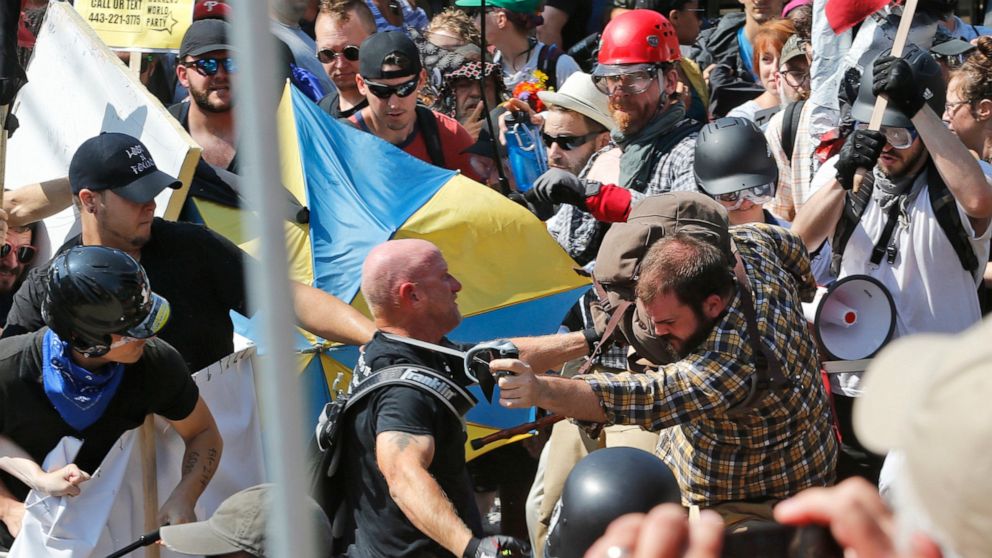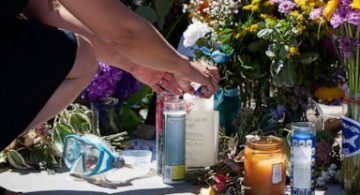
Federal charges against three alleged members of a violent white supremacist group accused of inciting violence at California political rallies were dismissed by a judge who found their actions amounted to constitutionally protected free speech.
Prosecutors said members of the Rise Above Movement conspired to riot by using the internet to coordinate hand-to-hand combat training, traveling to protests and attacking demonstrators at gatherings in Huntington Beach, Berkeley and San Bernardino. The group also posted videos to celebrate violence and recruit members.
Despite the group’s “hateful and toxic ideology,” a rarely used criminal statute passed during civil rights and Vietnam War protests went too far in regulating free speech, Judge Cormac J. Carney ruled Monday in U.S. District Court in Los Angeles.
Carney said the Anti-Riot Act of 1968 — most famously used to prosecute the “Chicago Eight,” including Abbie Hoffman, Bobby Seale and Tom Hayden for conspiring to incite a riot at the ’68 Democratic National Convention — was unconstitutional in part because it criminalized advocating violence when no riot or crime was imminent. He said prosecutors cited social media posts the men made months before and months after the rallies.
“Some posts express repugnant, hateful ideas,” Carney wrote. “Other posts advocate the use of violence. Most, if not all, are protected speech.”
The judge threw out the charges and ordered the release of alleged RAM leader Robert Rundo and suspected member Robert Boman. Charges against Aaron Eason, who was free on bond, were also dropped.
Defense attorney John McNicholas, who represented Eason, said his client was never a member of RAM and committed no crime.
He said the men thought they were doing good going to conservative rallies to counter the anti-fascists known as Antifa who were “committing acts of violence to suppress speech they disagreed with.” He criticized prosecutors for not pursuing charges against Antifa members that he said instigated violence and doused rally participants with pepper spray.
“Beyond the unconstitutional nature of the statute, nothing about the case makes sense because the people inciting the riot were never charged with a federal offense,” McNicholas said.
The Los Angeles ruling alarmed groups that track white supremacist activity and fear the court victory could empower the group known for espousing anti-Semitic and other racist views.
RAM’s account on Gab, a social media network known as a haven for racists and anti-Semites, hailed the dismissals and announced it would relaunch its Right Brand clothing line.
“It underscores their sense of vindication,” said Joanna Mendelson of the Anti-Defamation League. “This court victory has the great potential of giving them renewed energy and will reinvigorate the group overall.”
Prosecutors were disappointed with the ruling and reviewing grounds for appeal, spokesman Ciaran McEvoy said.
A federal judge in Virginia reached a conclusion opposite of Carney’s in a similar case involving other California members of RAM who participated in violent white nationalist rallies in both states.
Four alleged members of the group pleaded guilty and admitted punching and kicking counter-protesters as white nationalists led a torch-lit march at the University of Virginia and at the “Unite the Right” rally in Charlottesville in August 2017.
Defendants in those cases plan to appeal on the grounds that the statute is unconstitutional because it is overbroad, vague, and infringes on protected First Amendment activities, said Lisa Lorish, assistant federal public defender in Charlottesville. She expects the appeals court will agree with Carney’s reasoning.
There are plausible arguments in support of both decisions — with Carney taking a broad interpretation of the law and Judge Norman Moon in Virginia taking a narrow one, said Eugene Volokh, a law professor at the University of California, Los Angeles.
The conflict between the rulings on opposite coasts could rise to the Supreme Court if both rulings are appealed and circuit courts reach different conclusions, he said. But that’s far from certain.
In the California case, a fourth defendant, Tyler Laube, who pleaded guilty to the conspiracy charge in November, filed papers in court Tuesday to withdraw his guilty plea and have the charges against him dismissed after Carney encouraged him to do that, attorney Jerome Haig said.
Laube was facing nearly three years in prison after he admitted that as a member of the group he assaulted counter-protesters at a “Make America Great Again” rally in Huntington Beach in 2017.
Brian Levin, director of the Center for the Study of Hate and Extremism at California State University, San Bernardino, said if members discussed a criminal plan and took steps to carry it out their speech was not protected.
“The Supreme Court has basically held that hateful speech is protected, however violence and conspiracies are not,” Levin said. “That’s where I think the judge may have gotten this one wrong.”





